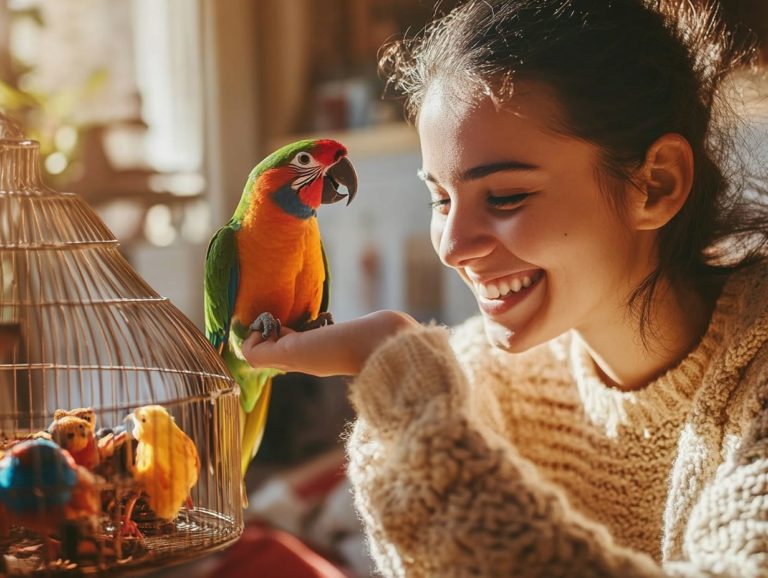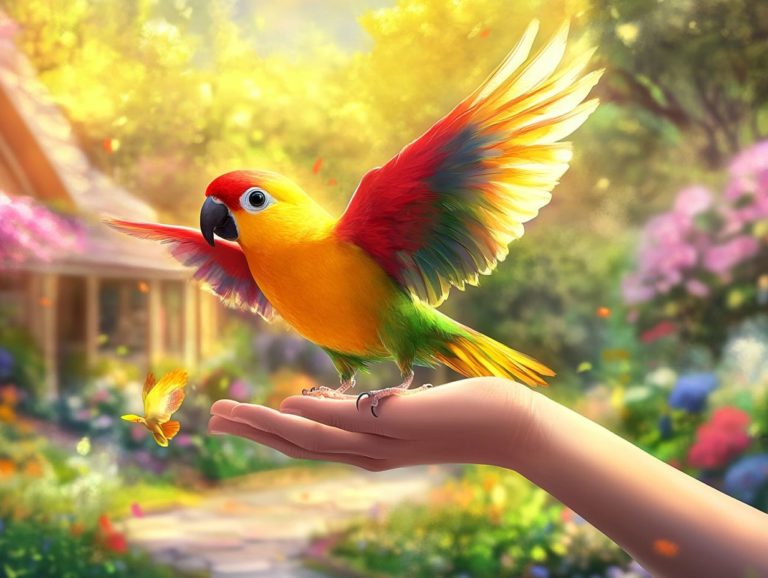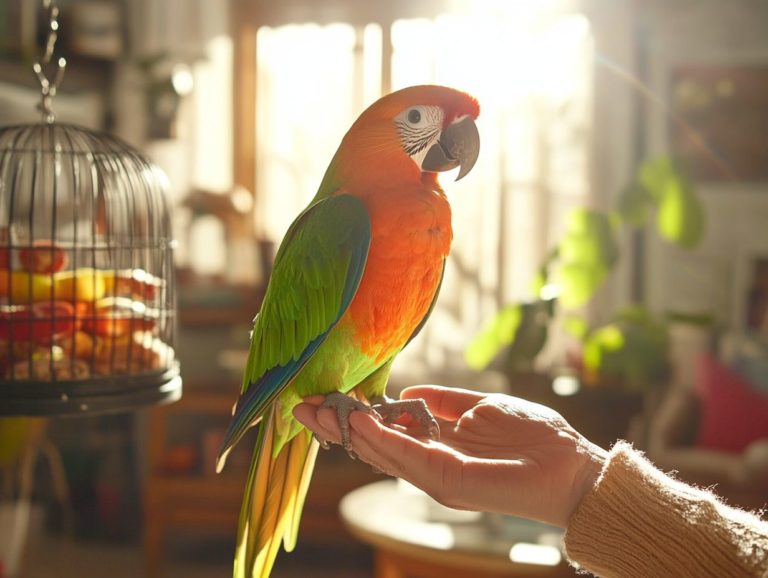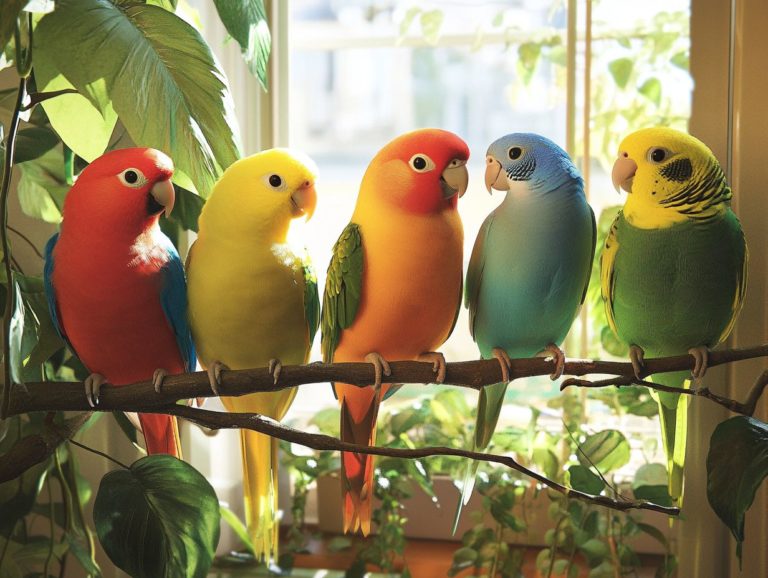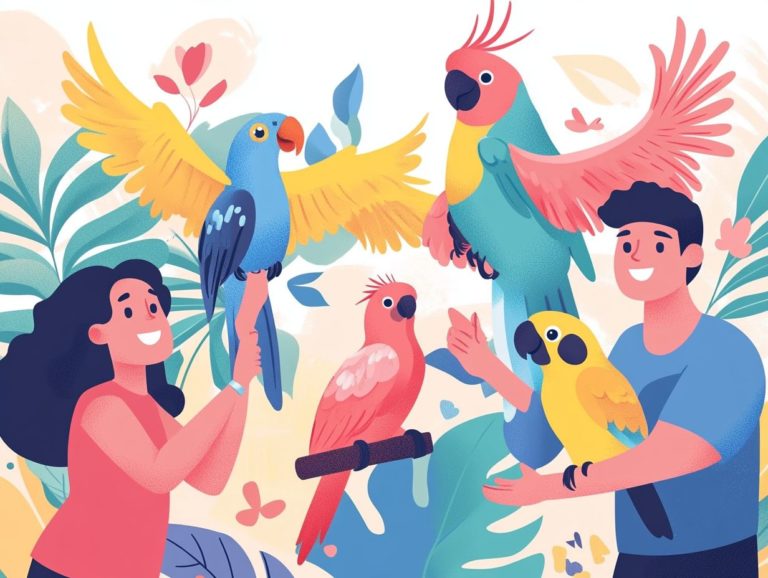Bird Adoption Myths: Separating Fact from Fiction
Bird adoption is on the rise as more individuals discover the joy and companionship that these feathered friends offer. However, misconceptions often cloud the process, leaving potential adopters feeling hesitant.
This article illuminates bird adoption by debunking common myths and showcasing its environmental and community benefits. You ll find essential guidance on preparation and selection.
Whether you re a seasoned bird enthusiast or a curious newcomer, you ll uncover valuable insights to help you embark on this fulfilling journey.
Contents
- Key Takeaways:
- The Growing Popularity of Bird Adoption
- Myths Surrounding Bird Adoption
- The Benefits of Bird Adoption
- Positive Impact on Environment and Community
- How to Prepare for Bird Adoption
- Essential Supplies and Considerations
- Choosing the Right Bird for Adoption
- The Adoption Process
- Frequently Asked Questions
Key Takeaways:
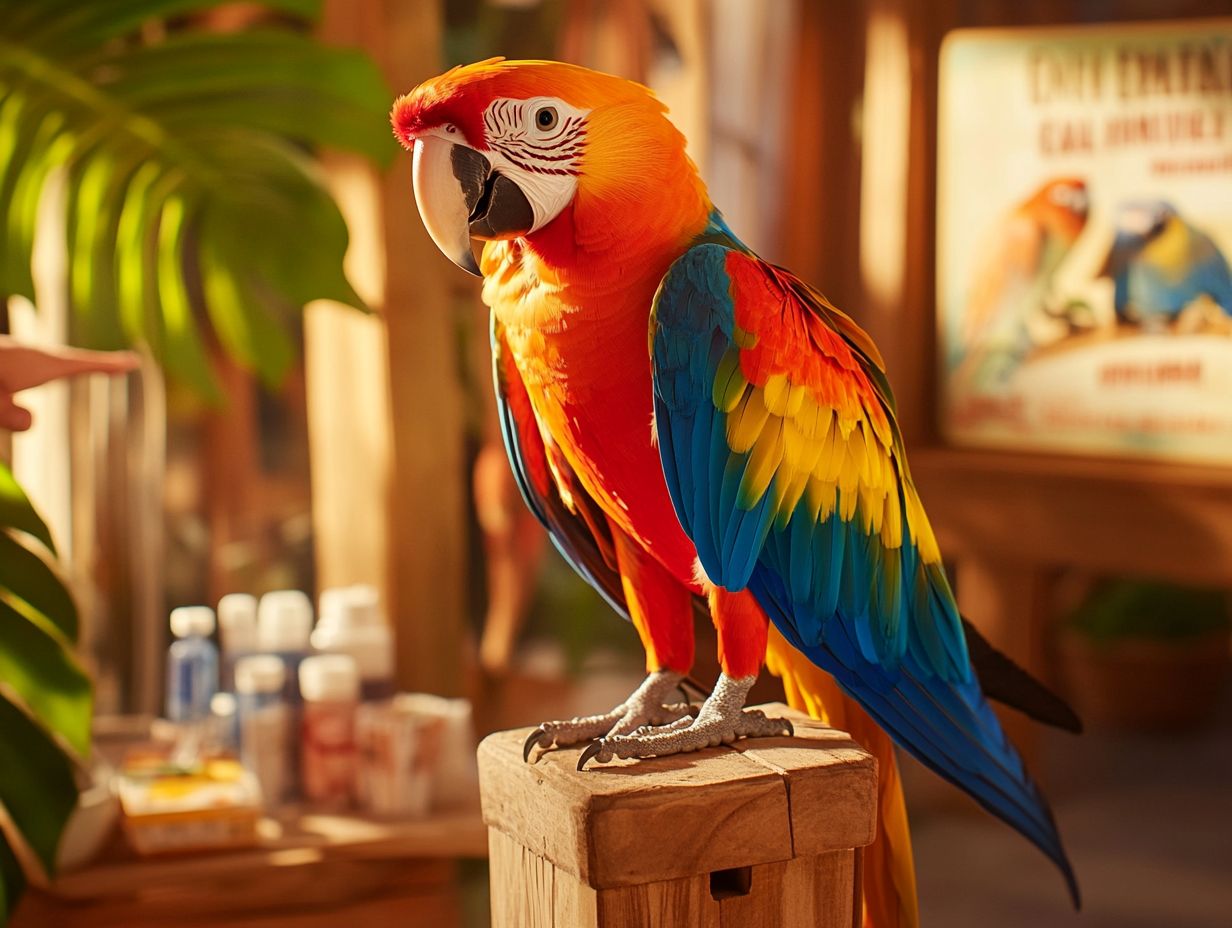
- Bird adoption is increasingly popular, but many myths need to be debunked.
- Adopting a bird benefits you, the environment, and the community.
- Proper preparation includes obtaining essential supplies and choosing the right bird.
The Growing Popularity of Bird Adoption
Recently, more people are adopting birds, changing the landscape of companion animals. Birds like African Grey Parrots, Budgies, Cockatiels, and Macaws are becoming beloved avian companions.
Individuals and families are experiencing the joy and responsibility of meeting the specific needs of these unique creatures. This awareness supports the commitment to providing a safe and nurturing environment for rescued birds.
Myths Surrounding Bird Adoption
Despite the growing interest in bird adoption, common myths about cockatiels and misinformation may dissuade you. Many people incorrectly assume that all birds have the same dietary needs.
Recognizing that species-specific care is vital for their well-being is crucial. Familiarizing yourself with parrot diet guidelines ensures you provide healthy feeding practices for your feathered friends.
Debunking Common Misconceptions
It’s essential to debunk misconceptions about pet birds so you can make informed decisions. Understanding bird adoption and your family is crucial, as misinformation can lead to harmful practices, making it vital to get the facts straight.
For example, while many believe all cooking oils are safe for birds, there are healthier alternatives to consider. Incorporating safe vegetables into their diet is equally important.
Another common myth is that seeds can be the foundation of a bird’s diet. In reality, a varied diet with fruits, vegetables, and high-quality pellets is crucial for health.
Some owners assume their birds are naturally social, but many species need gradual introductions and specific interaction strategies to thrive.
Understanding these nuances strengthens the bond between you and your pet. By providing evidence-based information on their dietary needs and social behaviors, you create a fulfilling environment where your bird can flourish.
The Benefits of Bird Adoption
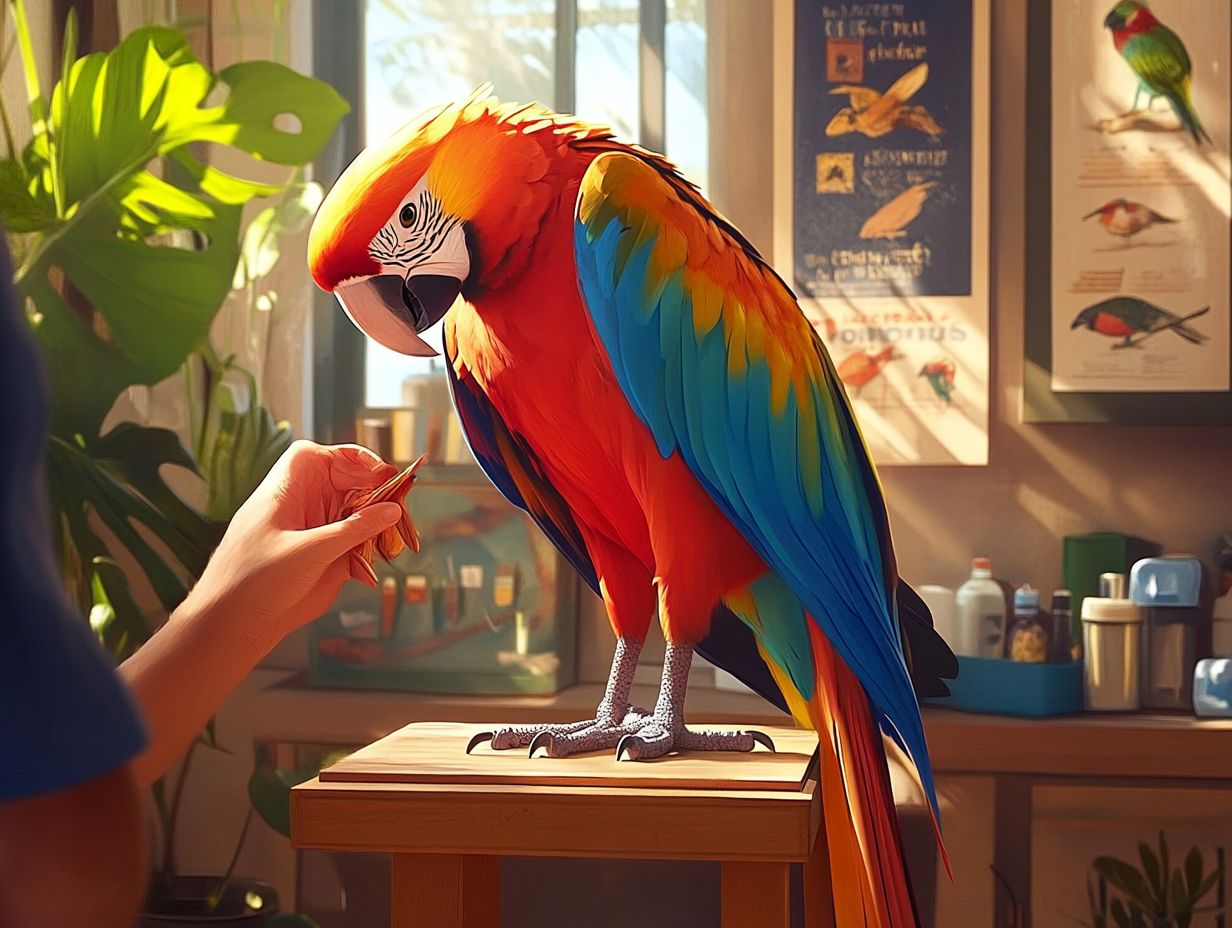
Adopting a bird offers many benefits not just for you and your family, but for the environment and the wider community. It s a fulfilling choice!
By adopting instead of purchasing from a breeder, you play a vital role in bird rescue efforts. This decision gives these birds a much-deserved second chance at life and fosters a unique bond that enriches both their lives and yours!
Positive Impact on Environment and Community
The positive impact of bird adoption goes far beyond your own joy. It resonates through the community and environmental realms that often get overlooked. By adopting rescued birds, you re not just providing a loving home for these feathered friends; you re also taking a stand against the troubling trends of loss of bird homes and wildlife trafficking. You play a vital role in environmental conservation efforts.
When you open your heart and home to rescued birds, you promote a culture of empathy that encourages others to recognize the importance of wildlife preservation. This growing awareness can spark grassroots initiatives, community events, and partnerships with local conservation programs aimed at safeguarding natural habitats.
Each rescued bird you welcome into your life contributes to the recovery of declining populations, serving as a beacon for wildlife advocacy. The ripple effects are significant; fostering a community that values bird adoption often inspires collective actions toward various forms of environmental stewardship. This reinforces our shared responsibility to safeguard the planet for future generations.
How to Prepare for Bird Adoption
Preparing for bird adoption requires thoughtful planning and a solid grasp of pet bird care. This ensures that you are fully equipped with the essential knowledge and supplies to foster a safe and nurturing environment for your new avian companion.
It’s crucial to consider a range of must-have items for winter bird care, such as:
- cages
- perches
- toys
- appropriate food
Assessing your home s safety for birds is vital. This allows you to craft a haven where they can truly thrive and flourish.
Essential Supplies and Considerations
When preparing for bird adoption, it s essential to understand the necessary supplies that play a pivotal role in successful bird care. These items directly impact your bird’s comfort and well-being. From cages that offer ample space to safe vegetables that promote a healthy diet, each detail warrants thoughtful consideration as you research before welcoming a feathered friend into your life.
A well-structured cage provides a safe haven and offers ample room for exercise and play crucial elements for your bird’s physical health. Food and water bowls should be designed for easy cleaning and refilling, ensuring that hydration and nutrition are consistently prioritized.
Regarding diet, selecting a variety of pellets (specially formulated bird foods that provide balanced nutrition), seeds, and fresh greens is vital. However, it s equally important to ensure these foods are free from pesticides and spoilage. Offering perches with various textures supports healthy foot development, while engaging toys keep your bird mentally stimulated and stave off boredom.
Every item you choose contributes to fostering a nurturing environment. This environment can help your bird thrive for the long haul.
Choosing the Right Bird for Adoption
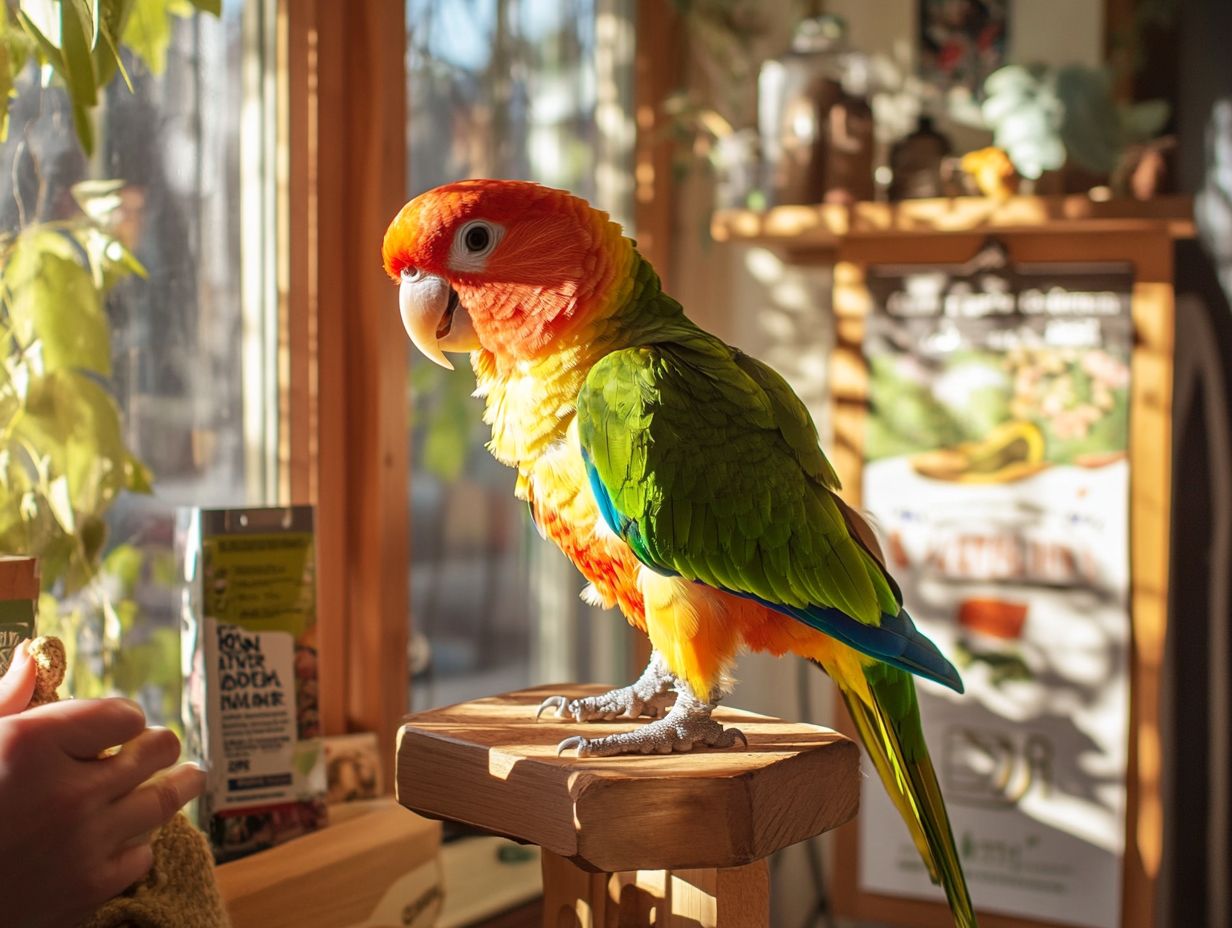
Choosing the right bird for adoption is a significant decision that demands your careful consideration! It s essential to think about various factors to ensure a harmonious match between the bird’s personality and your lifestyle.
Whether you’re drawn to the playful nature of a Conure or the more reserved demeanor of a Cockatiel, understanding each bird’s specific needs and behaviors is vital. This knowledge will also help you gauge the potential for bonding, making your selection process crucial for your long-term happiness together.
Start your journey of bird adoption today and help make a difference!
Factors to Consider and Questions to Ask
When you decide to adopt a bird, a multitude of factors come into play, guiding your selection process as a future bird owner. Consider asking yourself questions about the bird’s age and behaviors that vary from one type of bird to another especially with parrots and how well the bird will fit into your family dynamics. Thorough research is essential to ensure a harmonious match for both you and your new feathered friend.
Dive deep into understanding the unique characteristics and needs of different bird species! For instance, while some birds are social butterflies that thrive on interaction, others might crave solitude and require less handling. Inquiring about their typical temperaments and vocalization tendencies can significantly shape your adoption journey.
Consider the bird’s dietary preferences and the level of care it requires, including its socialization needs. This understanding plays a vital role in crafting a nurturing environment. By grasping these behavioral nuances, you’ll be better equipped to choose a feathered companion that aligns seamlessly with your lifestyle, setting the stage for a rewarding and fulfilling relationship.
The Adoption Process
The adoption process for birds is a carefully curated journey that encompasses several important steps, including bird rescue considerations, designed to ensure that you are fully prepared to welcome your new feathered companion into your home.
Grasping the unique needs of birds and the nuances of bird rescue is crucial during this process, as it equips you with the knowledge necessary to understand what to expect and how to cultivate the perfect environment for your new friend, including understanding common bird myths.
What to Expect and How to Prepare
Understanding what to expect during the adoption process is crucial for you as a future bird owner, as it lays the groundwork for a smooth transition into pet bird care and involves research before adopting. Preparing for adoption involves not just gathering supplies and familiarizing yourself with potential health issues in parrots but also understanding the responsibilities and requirements associated with bird rescue considerations, including species-specific care.
This stage is vital for ensuring your new companion thrives in a healthy environment. Engaging with local rescue organizations like Mickaboo Companion Bird Rescue is a great step, as they often provide invaluable resources, including medical histories and behavioral assessments for various species such as the African Grey Parrot, Budgie, and Cockatiel. It s essential to recognize that adopting a bird is a long-term commitment one that demands ongoing care, a suitable diet following parrot diet guidelines, and mental stimulation to keep these intelligent creatures both healthy and happy.
Many rescues, such as Prego Dalliance Sanctuary in St. Cloud, MN, also offer support and guidance after adoption, helping you navigate the complexities of avian behavior and socialization, including bonding with birds. By thoroughly preparing for the adoption journey, including providing safe vegetables for birds like Apple, Sunflower, and incorporating cooking oil alternatives, you can create a nurturing space for your feathered friend.
Frequently Asked Questions
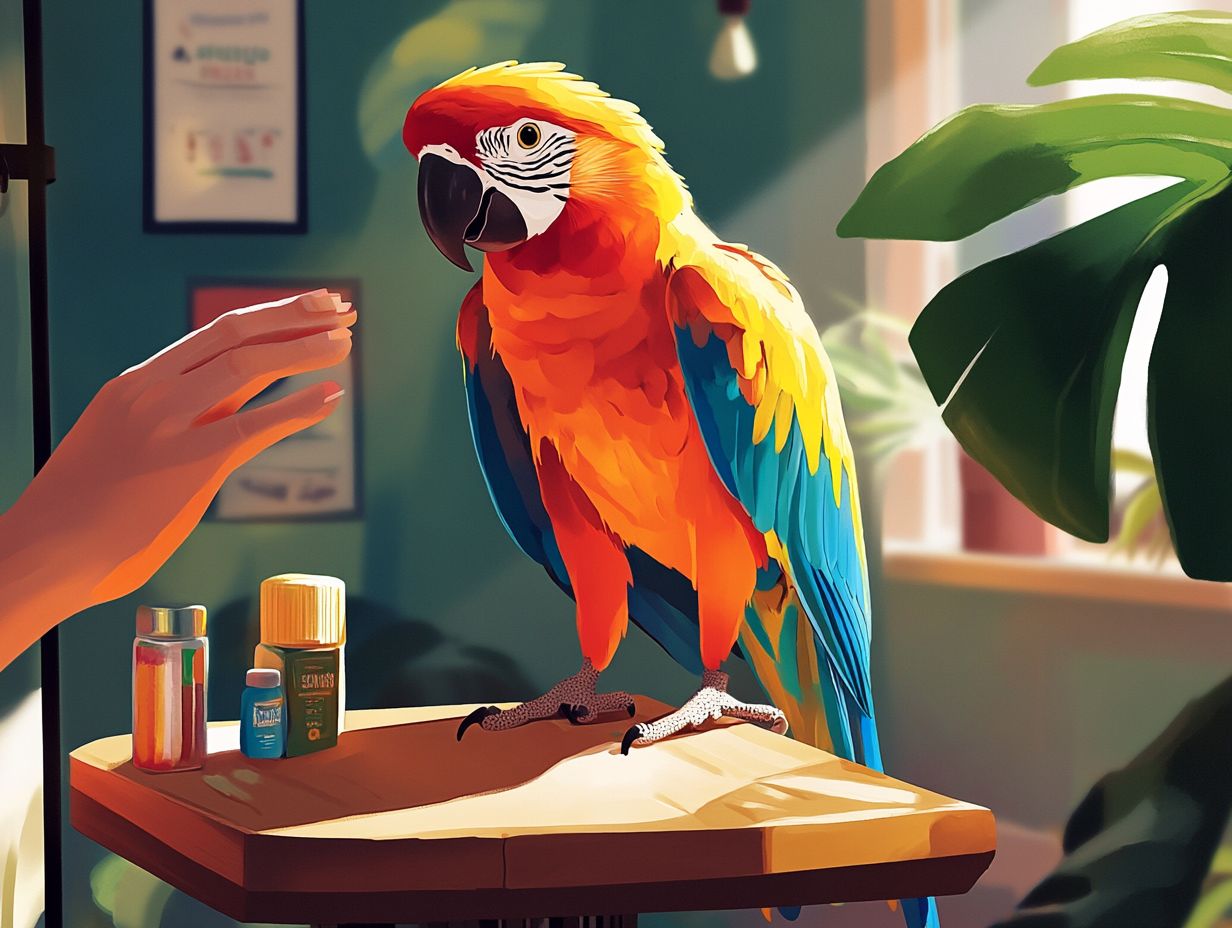
What are some common myths about bird adoption?
Some common myths about bird adoption include misinformation about birds, the belief that they are low maintenance pets, that they don’t bond with their owners, and that they can’t be trained. It’s important to explore common myths about pet birds to properly understand their care.
Is it true that birds are low maintenance pets?
No, this is a common misconception. Birds require a lot of time, attention, and specialized care, just like any other pet.
Do birds bond with their owners?
Yes, birds are highly social animals and can form strong bonds with their owners, making adopting rescued birds an enriching experience! They often crave attention and can become depressed if they are not given enough social interaction.
Is it difficult to train a bird?
Contrary to popular belief, birds can learn exciting tricks! With patience and consistency, most birds can be trained.
Are older birds harder to adopt?
No, older birds often make great companions. They have established personalities and may already be trained!
Do all birds make loud noises?
Some birds, like parrots, are known for being loud. However, species like finches and doves are much quieter, making them perfect for various living situations.
Start exploring the wonderful world of birds today!

